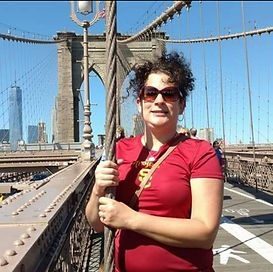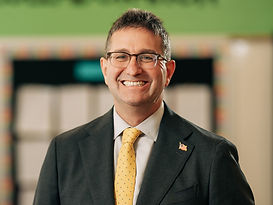GUEST COLUMN.
COLLABORATING ON PROCUREMENT LAW
By Megan Smyth, Director of Legal Education, National Association of State Procurement Officials

Inflation, supply-chain disruptions, and rapidly advancing technology are just a few of the reasons state procurement has become increasingly complicated -- and that’s just the beginning. Constantly changing priorities, political considerations, and budget constraints create a whole host of challenges facing people who work in government contracting. Further, risk management and mitigation can be a struggle in the best of circumstances, let alone in the uncertain times in which we find ourselves.
Key to finding solutions for the issues that bedevil the procurement community is understanding the law around procurement. With that in mind, The National Association of State Procurement Officials (NASPO) is supporting state procurement officials with education, best practices, strategic partnerships, and networking opportunities.
NASPO has been targeting attorneys who are government contracting specialists, among other things. These lawyers may be located in the attorney general’s office or embedded in the procurement office and/or the agency that houses procurement for the state.
At this crucial moment, it is more important than ever for state procurement officials and those attorneys who support procurement to come together to share expertise, collaborate on best practices, and discuss how to mitigate risk for the states.
To help facilitate this kind of collaboration, each year, NASPO holds Law Institute, a conference that welcomes three procurement attorneys and/or the chief procurement officer for each of the states, territories, and the District of Columbia to a three-day CLE (Continuing Legal Education) course focused on state procurement and government contracting law. We provide 15-plus free hours of instruction on state procurement law and encourages Chief Procurement Officers to attend with their legal team to foster better communication and cross-collaboration.
NASPO Law Institute begins with a New Attorney Bootcamp, a day-long course designed to focus on key elements of procurement law that attorneys in their first five years of practice should know. Law Institute brings subject matter experts from around the world directly to our state attorneys and facilitates peer-to-peer learning and networking. We celebrated 10 years of legal education in 2023, with over 128 hours of free CLE instruction and 1,332 attorneys and CPOs educated.
The legal education offered by NASPO is unique because it comes from the perspective of the public procurement officials who do the day-to-day work in the states. The goal of public contracting – fair, transparent, and open competition – is the foundation upon which our curriculum is based. Cross-education between procurement staff in state government, and the attorneys who support them, offers substantial value, yielding more efficient processes, better risk management, and enhanced legal compliance.
This synergy between legal expertise and procurement know-how not only optimizes resource allocation but also safeguards against potential legal pitfalls. The attorneys are there to help avoid the problem altogether by seeing down the road a bit and being able to identify risk from another perspective. It’s like having one trail scout on the ground and one in a tall tree – that way you can see the whole picture.
No doubt, procurement staff are experts navigating the intricacies of purchasing goods and services for government entities, ensuring cost-effectiveness and adherence to regulations – no one can expect them to also have the nuanced legal understanding required to mitigate contractual risks comprehensively. By fostering collaboration with attorneys, procurement professionals gain access to legal insights that can enhance procurement strategies and agreements.
One message that resonates throughout this training is simple, straightforward and often ignored; To be proactive rather than reactive when it comes to potential issues in a procurement, it’s important to involve an attorney early in the process Attorneys bring specialized legal knowledge and expertise to the table. Their understanding of contract law, regulatory compliance, and potential liabilities is invaluable in structuring procurement contracts that properly mitigate legal risks.
By working closely with procurement staff, attorneys can provide guidance specifically on drafting contracts, negotiating terms, and resolving disputes, thereby cutting down on time spent solving problems.
Cross-education between procurement staff and attorneys cultivates a mutual respect and understanding of each other's roles, challenges, and priorities. Procurement professionals gain a deeper appreciation for legal considerations, enabling them to proactively identify and address potential legal issues in procurement activities. Conversely, attorneys develop a better understanding of the practical implications of legal advice on procurement operations, enabling them to provide more tailored and actionable guidance.
NASPO is working on expanding our offerings and our reach into the procurement attorney community through website development, work-product creation, and continuing to convene the key players in the legal and procurement worlds. In the coming months, we will be bringing together attorneys from the state supplier community to discuss how to improve state contract negotiations and presenting educational content to the supplier community to increase understanding and communication.
Understanding is a good place to start for any relationship – and we hope to assist in laying the foundation for state procurement professionals and attorneys to do just that, even in these challenging times.
The contents of this Guest Column are those of the author, and not necessarily Barrett and Greene, Inc.
#StateProcurementManagement #StateProcurementLegalEducation #NationalAssociationOfStateProcurementOfficials #NASPO #ProcurementAttorneyCrossEducation #StateProcurementLaw #AttorneyChiefProcurementOfficerRelationship #StateProcurementLegalEducation #NASPOLawInstitute #NASPOLegalEducation #ManagingStateContractualRisk #B&GGuestColumn #MeganSmyth



































































































